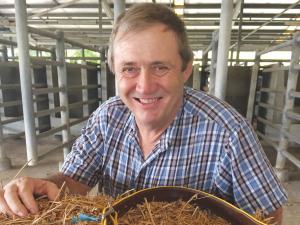Wired for Science: Understanding the feeding habits of mealybug
Fussy children might be frustrating, but fussy mealybugs could help protect the New Zealand wine industry from grapevine leafroll-associated virus 3.
 Professor Derek Bailey from New Mexico State University led the research team looking into ryegrass staggers in sheep.
Professor Derek Bailey from New Mexico State University led the research team looking into ryegrass staggers in sheep.
Livestock researchers around the world can now remotely detect ryegrass staggers in sheep using on-animal sensors.
This follows research findings from an international team – including researchers from Lincoln University and CQ University in Central Queensland.
Results from the study means that, in the future, farmers will be able to act quickly and move sheep to new pastures when they begin to display the signs of (grass) staggers – potentially improving their bottom line by $100 per hectare.
Grass stagger is caused by the consumption of plants such as phalaris and ryegrass – common in both Australia and New Zealand – that
are infected with toxic strains of endophyte. It can be fatal if animals have experienced prolonged exposure to toxic pasture.
Toxic strains of endophytes can also be present in tall fescue, which is a common forage in the eastern and Midwestern United States.
The research team was led by Professor Derek Bailey from New Mexico State University, who also holds an Adjunct position at CQUniversity and works closely with CQU’s Rockhampton-based Precision Livestock Management group led by Prof Mark Trotter.
The pair also worked with researchers from Lincoln University in monitoring the behaviours of sheep grazing perennial ryegrass using accelerometers and GPS devices.
“Visual monitoring or periodic testing for staggers is time consuming and labour intensive, especially when sheep are kept in large groups or in extensively grazed pastures,” Trotter explains. “However, on-animal sensors can remotely monitor and detect changes in animal behaviour, so that when certain behaviours are exhibited they can determine if an animal is ill.” He adds that the emergence of smart-tags for real-time monitoring of livestock may allow farmers to respond more rapidly when animals become ill.
“Previous economic modelling has suggested that the value to the sheep industry of being alerted to staggers and then being able to quickly manage it would be worth over $100 per hectare in additional income.”
The research findings, recently published in the journal Smart Agricultural Technology, show that animals grazing the infected pasture moved more slowly than sheep in the endophyte-free control pasture.
Machine learning analysis of accelerometer data showed that the activity of sheep that suffered staggers was increased in the morning and midday towards the end of the trial.
The study was conducted at Lincoln, where sheep fitted with collars containing accelerometers and GPS tracking devices were grazed on ryegrass for 17 days in autumn.
Bailey says the GPS devices tracked animals at 3-minute intervals and the accelerometers recorded movements at 12 times per second.
“Although more research is needed, the combination of machine learning and real-time monitoring of sheep behaviour with accelerometers and GPS has potential to detect when endophyte toxin levels affect their well-being (ryegrass staggers) and the animals should be moved to a different pasture,” Bailey concludes.
Tickets are now available for Beef + Lamb New Zealand’s (B+LNZ) Out the Gate, returning from 19-21 May 2026 at Te Pae, Christchurch.
Dairy Women's Network (DWN) is welcoming AgriHealth as a new partner.
Northland Field Days patron Ross Newlove remembers the inaugural field days he attended 40 years ago.
Southland farmer Murray Donald has been appointed as chair of Safer Farms, the industry-led organisation focused on reducing harm, injuries and fatalities in the agricultural sector.
National Lamb Day returns this Sunday, 15 February, with Beef + Lamb New Zealand Inc calling on Kiwis to fire up their barbecues and celebrate the people and the product that put New Zealand on the world map.
When it comes to arranging the sound system at Northland Field Days, no one does it better than Colin Finlayson.

OPINION: Here w go: the election date is set for November 7 and the politicians are out of the gate…
OPINION: ECan data was released a few days ago showing Canterbury farmers have made “giant strides on environmental performance”.